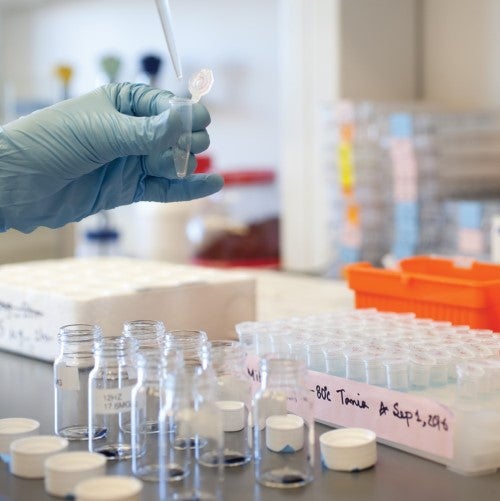The University of Rhode Island (URI) Occupational Health (OH) Program strives to ensure the health and safety of University employees, students and support staff. OH Program staff provide information and support to persons working in the research environment, including animal care and use. The goals of the program are to prevent injury or disease from exposure to hazards in the workplace.
URI Health Services provides clinical services, including medical evaluations, counseling, immunizations, follow-up care after an injury or exposure, and maintaining health records.
Services available
- Conduct health screening for use of animal or laboratory facilities
- Perform occupational health reviews of research protocols involving biohazards and animal care and use
- Provide workplace safety and medical management recommendations
- Provide occupational health consultation to employees or students as requested
- Investigate incidents involving biohazards, sharps, and/or animal exposures and identify prevention strategies, in coordination with URI Environmental Health and Safety (EHS)
- Coordinate post-exposure care for biological and animal care and use research
- Develop medical management guidance and facilitate clinical services and care
- Administer and review medical questionnaires for participants in the University’s Respiratory Protection Program
What you can do to stay safe?
Principal Investigators and Supervisors
|
Employees
|
- Provide documented agent-specific and site-specific hazard awareness information to personnel including possible risks associated with viruses or gene delivery vectors that contain oncogenes; reproductive and teratogenic risks for males and females; immunologic risks associated with biohazards; signs and symptoms of exposure, and safe work requirements.
- Ensure personnel are aware of post-exposure and emergency procedures.
- Offer appropriate immunizations and/or medical surveillance as a specified by EH&S.
- Inform staff to contact the URI Health Services for any questions or concerns related to personal or occupational health, for changes in personal health status, and if they develop signs or symptoms consistent with exposure to hazardous agents used in the workplace.
- Maintain records for each employee documenting the requirements to work in the laboratory or facility.
- Be aware of restrictions for minors in labs. See URI Risk Management for specific policies.
- Register all visiting scholars, volunteers, and non-URI personnel who will be working in the laboratory. See URI Risk Management for the Volunteer Acknowledgement, Agreement, and Liability Form.
- See URI Biosafety Manual for more information.
|
- Be aware of how your health status may be impacted by work with hazardous agents.
- If personal health concerns or questions arise from working with hazardous materials or agents, contact URI Health Services for a confidential occupational health consultation.
- Comply with occupational health requirements and guidelines specified by your PI or supervisor and EH&S.
- Be aware of the hazards in your workplace and adhere to safe work practices. Bring concerns to the attention of your PI or supervisor.
- See URI Biosafety Manual for more information.
|




